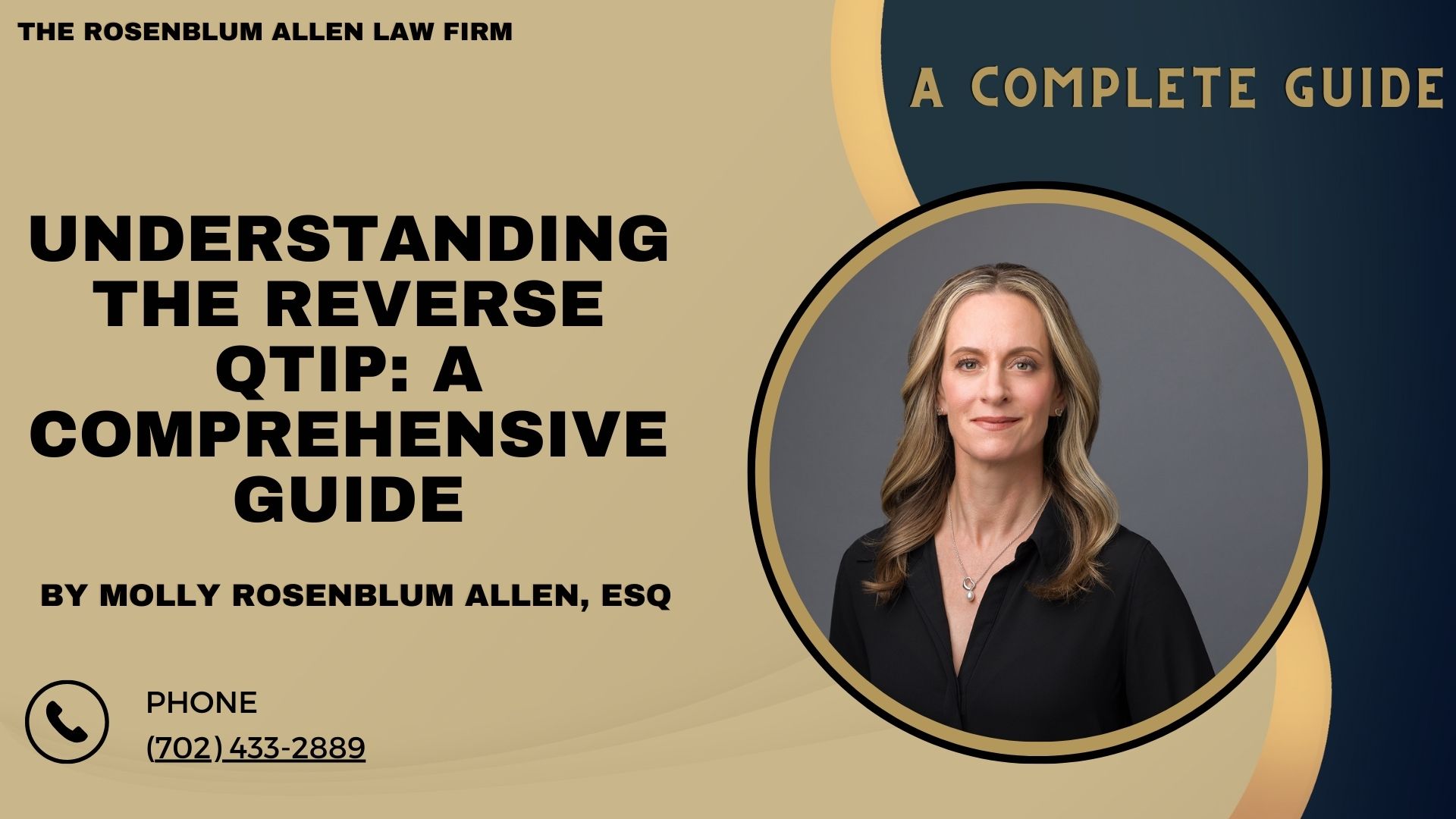Estate planning is vital. It ensures the smooth transfer of assets and wealth to future generations. One popular strategy in recent years is to use a Reverse QTIP trust. It is commonly known as Reverse QTIP. This is a complete guide. We will cover Reverse QTIP, its benefits, how it works, and key things to consider when using it in your estate plan.
Note: Make sure to also check out our Nevada Estate Tax post while you’re here.
What is Reverse QTIP?
A QTIP trust provides for a surviving spouse financially. But, it also keeps control over giving assets to other beneficiaries. Reverse QTIP is different. It lets people protect their wealth and keep it in the family. They can also get some tax benefits.

Benefits of Reverse QTIP
Preservation of assets within the family
Estate planning often involves ensuring that the wealth stays in the family. The person accumulated wealth over a lifetime. Reverse QTIP addresses this concern. It protects assets from risks that may arise after the surviving spouse’s death. These risks can include remarriage, creditor claims, or the influence of new relationships.
Tax advantages
Reverse QTIP can offer significant tax advantages, particularly about estate tax planning. By establishing a Reverse QTIP trust, individuals can cut their estate tax liability. This strategy allows for using available estate tax exemptions and deductions. It results in a more tax-efficient transfer of wealth to the next generation.

How Does Reverse QTIP Work?
To understand Reverse QTIP, we must delve into how it works.
Establishing a Reverse QTIP trust:
To start, you must establish a Reverse QTIP trust. This involves creating a legal entity. It holds the assets and distributes them. It does so according to the terms outlined in the trust document. Key factors include selecting beneficiaries and trustees. They will oversee the trust’s administration and funding with fitting assets.
Distribution of income and principal:
A Reverse QTIP trust’s key feature is its ability to give income and money to the surviving spouse. The trust document will outline the terms for such distributions. It will ensure the comfort and financial well-being of the surviving spouse. But, there may be limits to prevent misuse or excessive depletion of trust assets.
Survivorship issues:
Reverse QTIP trusts also handle those issues. They are from the surviving spouse’s remarriage or new relationships. They address potential complications. The trust document can include provisions to protect the interests of the beneficiaries. It can also mitigate conflicts that may arise in such situations.

Considerations for Implementing Reverse QTIP
Before adding Reverse QTIP to your estate plan, you must consider key factors. This will ensure its effectiveness and suitability for your circumstances.
Eligibility and qualification requirements:
Marital status: Reverse QTIP is typically applicable to married couples. If you are unmarried or in a non-traditional relationship, alternative estate planning strategies may be more suitable.
Age and health: Considerations should be given to the age and health of both spouses, as well as their life expectancies, to determine the viability and duration of the Reverse QTIP trust.
Working with professionals
Consult an estate planning attorney: Reverse QTIP trusts involve complex legal and financial considerations. It is highly recommended to seek the guidance of an experienced estate planning attorney who can provide personalized advice and draft the necessary legal documents.
- Collaboration with financial advisors and tax professionals: Estate planning involves financial implications and tax considerations. Consulting with financial advisors and tax professionals can help ensure that the Reverse QTIP strategy aligns with your overall financial goals and minimizes tax liabilities.
Reviewing and updating the Reverse QTIP trust
- Regular evaluation of the trust’s effectiveness: As circumstances change, it is essential to periodically review your estate plan, including the Reverse QTIP trust, to ensure its continued relevance and effectiveness.
- Modifications based on changing circumstances or laws: Life events such as births, deaths, divorces, or changes in financial situations may necessitate alterations to the Reverse QTIP trust. Additionally, changes in tax laws or regulations may impact the trust’s efficiency, requiring adjustments to be made.

Examples and Case Studies
To show how Reverse QTIP works, let’s explore a few examples and case studies:
Example 1: John and Sarah’s Estate Plan
John and Sarah are a married couple in their 60s. They want to protect their wealth and pass it to their children. They also want to ensure that they financially support Sarah for her lifetime. They decided to establish a reverse QTIP trust as a part of their estate plan. By doing so, they can give Sarah trust income. This keeps the principal for their children’s benefit.
Case Study: The Smith Family’s Tax-Efficient Transfer
The Smith family’s estate is subject to significant estate taxes due to the value of their assets. They can use a Reverse QTIP trust. It allows them to use estate tax exemptions and deductions. This reduces their total tax. This ensures that more of their wealth goes to their children and future generations. Taxes will not diminish it.
Potential Challenges and Risks of Reverse QTIP
Reverse QTIP can be a helpful estate planning strategy. But, you must be aware of potential challenges and risks.
Limitations on control and flexibility:
Loss of control over assets: Once assets are transferred to the Reverse QTIP trust, the individual may have limited control over those assets. It is essential to carefully consider the implications and ensure that the trust’s terms align with your intentions.
Restrictions on modifying the trust: Depending on the specific provisions of the trust, it may be challenging to make changes once it is established. Consider whether the trust allows for flexibility in adapting to changing circumstances.
Uncertainty of future needs and circumstances
Changing financial needs: Predicting future financial needs can be challenging. It is essential to carefully consider the potential income and principal distribution requirements to address the surviving spouse’s financial needs adequately.
Unforeseen life events: Life is unpredictable, and unexpected events such as remarriage, disability, or changes in relationships may impact the effectiveness of the Reverse QTIP trust. Regular reviews and updates can help mitigate these risks.

Traditional QTIP trust
A Traditional QTIP trust provides similar benefits to a Reverse QTIP trust but with a different focus. In a Traditional QTIP trust, the surviving spouse receives income from the trust, and the trust creator determines the ultimate distribution of assets. This strategy may be more appropriate when maintaining control over the maximum distribution is a priority.
Lifetime gifts and direct bequests
Instead of setting up a trust, people can transfer assets through gifts. They can do this during life or in their wills. These methods provide more immediate control over asset distribution. They may be good for those who prefer simplicity and flexibility.

Breaking It All Down
This guide covered Reverse QTIP. It looked at its benefits, how to install it, its challenges, and alternatives. By understanding Reverse QTIP and working with professionals. People can craft an effective estate plan. The plan must meet their goals. They want to keep wealth, cut taxes, and transfer assets to future generations. Remember, estate planning is complex. Seeking professional help is crucial. It will help you make informed choices that fit your needs and goals.

Frequently Asked Questions
What exactly is Reverse QTIP?
Reverse QTIP is an estate planning strategy designed to preserve wealth within a family while also providing tax benefits. Unlike traditional QTIP trusts that focus on financially supporting a surviving spouse, Reverse QTIP prioritizes asset protection and control.
What are the advantages of using Reverse QTIP?
Reverse QTIP offers several benefits, including safeguarding assets within the family, protecting against risks such as remarriage or creditor claims, and providing tax advantages that can reduce estate tax liabilities.
How does Reverse QTIP function?
To implement Reverse QTIP, individuals must establish a Reverse QTIP trust, which acts as a legal entity to hold and distribute assets according to specified terms. The trust provides income and principal to the surviving spouse while also preserving assets for other beneficiaries.
What factors should I consider when incorporating Reverse QTIP into my estate plan?
Key considerations include eligibility requirements based on marital status and age, collaboration with estate planning professionals like attorneys and financial advisors, and regular reviews and updates to ensure the trust remains aligned with changing circumstances or laws.
Are there any potential challenges or risks associated with Reverse QTIP?
While Reverse QTIP can be beneficial, it’s essential to be aware of limitations on control and flexibility over trust assets, uncertainties regarding future financial needs, and unforeseen life events. Regular reviews and updates can help mitigate these risks.
What alternatives exist to Reverse QTIP?
Alternative options include traditional QTIP trusts, lifetime gifts, and direct bequests, each offering varying levels of control and flexibility over asset distribution depending on individual preferences and goals.
How do I select the most suitable estate planning strategy for my needs?
Choosing the right estate plan involves considering personal goals, financial circumstances, and family dynamics. Consulting with professionals such as estate planning attorneys and financial advisors ensures tailored advice to meet specific needs and goals.
Can I modify or update a Reverse QTIP trust?
Modifying a Reverse QTIP trust is possible but depends on the trust’s specific provisions. Reviewing the terms and consulting with professionals are crucial steps to ensure that any necessary changes comply with legal requirements and accommodate new circumstances or laws.
Is Reverse QTIP applicable to unmarried individuals or those in non-traditional relationships?
Reverse QTIP is typically designed for married couples, so unmarried individuals or those in non-traditional relationships may need alternative estate planning strategies tailored to their unique situations and goals.
How does Reverse QTIP help minimize estate tax liabilities?
By utilizing available exemptions and deductions, Reverse QTIP can significantly reduce estate tax liabilities, ensuring a more tax-efficient transfer of wealth to future generations and preserving assets that would otherwise be diminished by taxes.
Is the process of implementing Reverse QTIP complex?
Estate planning, including Reverse QTIP, can involve complex legal and financial considerations. Working with professionals such as estate planning attorneys is highly recommended to ensure that the strategy is executed correctly and tailored to individual needs and goals.

Glossary
Reverse QTIP: A strategy in estate planning that focuses on asset preservation and control. It involves establishing a Reverse QTIP trust, which provides income and principal to a surviving spouse while preserving assets for other beneficiaries.
Qualified Terminable Interest Property (QTIP) trust: A trust that provides financial support for a surviving spouse while allowing the trust creator to determine the ultimate distribution of the assets.
Estate planning: Arranging for managing and distributing one’s assets after death to fulfill specific wishes and minimize tax liabilities.
Estate tax: A tax imposed on the transfer of a person’s assets after their death. Reverse QTIP can help minimize estate tax liabilities by utilizing exemptions and deductions.
Trust: A legal entity that holds assets on behalf of beneficiaries according to the terms outlined in the trust document.
Marital status: Refers to the legal status of an individual about their marriage. Reverse QTIP is typically applicable to married couples.
Income Refers to the money an individual receives or trusts from various sources, such as investments or employment.
Principal: The original amount of money or assets invested or held in a trust before any income or gains are accrued.
Creditor claims: Individuals or entities seeking to collect debts owed by the trust or its beneficiaries.
Estate tax exemptions: Certain amounts of an estate’s value are not subject to estate tax. Utilizing exemptions can help reduce overall tax liabilities.
Estate tax deductions: Allowable deductions that can reduce the taxable value of an estate, resulting in lower estate tax liabilities.
Traditional QTIP trust: A trust that provides financial support for a surviving spouse while allowing the trust creator to determine the ultimate distribution of the assets, similar to a Reverse QTIP trust.
Lifetime gifts: Gifts made during an individual’s lifetime to transfer assets to beneficiaries. Lifetime gifts can be an alternative to establishing a trust.
Direct bequests: Specific instructions in a will designate asset transfer to beneficiaries upon the testator’s death.
Estate planning attorney: A legal professional specialized in assisting individuals with creating estate plans, including establishing trusts and drafting legal documents.
Financial advisor: A professional who guides on financial matters, including investment strategies, retirement planning, and estate planning.
Tax professional: An individual with expertise in tax laws and regulations who can provide advice on tax planning and help minimize tax liabilities.
Review and updates: The process of regularly evaluating and modifying an estate plan, including a Reverse QTIP trust, to ensure its continued effectiveness and alignment with changing circumstances or laws.

Additional Resources for You
Our lead attorney, Molly Rosenblum Allen, Esq, has created several valuable resources to assist you in your time of need. Here are some of the resources she has developed:
Las Vegas Estate Planning Attorney: If you require assistance with estate planning in Las Vegas, our dedicated team is ready to help. Visit our website at Las Vegas Estate Planning Attorney to learn more.
Las Vegas Trust Attorney: For all your trust-related legal matters, our experienced Las Vegas trust attorney can provide guidance and support. Find more information at Las Vegas Trust Attorney.
Tips On Estate Planning: Discover valuable tips and insights on estate planning by visiting our resource page at Tips On Estate Planning. This information can help you make informed decisions regarding your estate.
Estate Planning Checklist: Ensure you cover all essential aspects of estate planning with our comprehensive estate planning checklist. You can access the checklist at Estate Planning Checklist.
Making a Will: Our team can guide you through the process of creating a will. Visit Making a Will to find essential information and resources to assist you.
Estate Planning Services: Learn about the various estate planning services we offer at Estate Planning Services. Our team is ready to provide personalized solutions tailored to your unique needs.
Estate Planning Mistakes: Avoid common estate planning mistakes by familiarizing yourself with our informative content. Visit Estate Planning Mistakes to gain valuable insights and guidance.
Estate Planning Probate: If you require assistance with estate planning probate matters, our experienced team can provide the support you need. Find more information at Estate Planning Probate.
Feel free to explore these resources to gain a better understanding of estate planning and how our team can assist you in protecting your assets and ensuring your wishes are carried out.

Outside Resources for You
American Bar Association (ABA) – Estate Planning Resources: The ABA provides a wealth of information on estate planning, including articles, guides, and tools. Visit their website at American Bar Association – Estate Planning Resources to access these valuable resources.
AARP – Estate Planning and Wills: AARP offers a comprehensive guide to estate planning and wills, covering topics such as creating a will, power of attorney, and healthcare directives. Explore their resources at AARP – Estate Planning and Wills to help you navigate the estate planning process.
Estate Planning.com: Estate Planning.com is an online resource that provides articles, FAQs, and tools to help individuals with their estate planning needs. Visit their website at Estate Planning.com for valuable information and resources.
EstatePlanning.com: EstatePlanning.com offers a wide range of estate planning resources, including articles, videos, and a directory of estate planning professionals. Explore their website at EstatePlanning.com to access these helpful resources.
The Balance – Estate Planning: The Balance provides an extensive collection of articles on estate planning, covering topics such as wills, trusts, probate, and estate taxes. Visit The Balance – Estate Planning to access their informative articles.
EstatePlanning.org: EstatePlanning.org offers a variety of estate planning resources, including articles, guides, and a glossary of estate planning terms. Explore their website at EstatePlanning.org to enhance your understanding of estate planning concepts.
Estate Planning Council of America (EPCA): The EPCA provides educational resources and support for estate planning professionals, but their website also offers valuable information for individuals seeking estate planning guidance. Visit Estate Planning Council of America (EPCA) to access their resources.

A Special Message from Our Lead Attorney, Molly Rosenblum Allen, Esq

Dear Reader,
Thank you for taking the time to explore our estate planning resources. I hope you found them informative. They help you understand the importance of estate planning and the steps it involves.
If you have questions or want to discuss your situation more, please contact me and my team. We are here to help you with estate planning. We will give you personalized solutions that fit your needs.
To get the ball rolling on your estate planning journey, please call us at (702) 433-2889. We understand that each person’s situation is unique. We are committed to guiding and supporting you.
Our law firm prioritizes providing exceptional legal services to our clients. We don’t offer free consultations. But, we assure you that seeking our help will be worth it. We will treat you with professionalism and expertise.
We look forward to assisting you with your estate planning needs.
Best regards,
Molly Rosenblum Allen, Esq.




